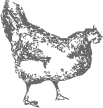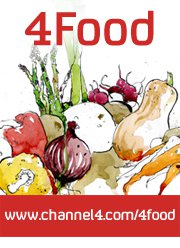
If ever there was a group that deserved the moniker ‘the forgotten millions’ it is the vast number of chickens living in squalid conditions to feed the UK’s unquenchable demand for cheap chickens and eggs. Until last week that is, when the forgotten millions were suddenly in the limelight, stars of their own week of TV programmes aired on mainstream terrestrial television.
As an occasional chicken-eater who always buys organic for its higher welfare standards I wasn’t expecting to particularly shocked by these programmes. Naive probably, as the level of access afforded to these programmes was pretty much unprecedented. There were two scenes that left me stunned:
– Hugh Fearnley-Whittingstall performing a routine cull of birds in the intensive rearing facility used for the programme. Any bird failing to gain weight or with any hint of leg injury was immediately extracted from the barn and killed on site on a daily basis. The shock was partly in the sheer number of birds that just don’t make it through the system at all, and partly the realisation that throughout their short life-span (around 35 days) chickens are managed effectively as a crop rather than livestock, always weeded out rather than treated.
– Jamie Oliver gassing a group of new-born chicks to death. It should have been obvious really; only female chickens can lay eggs so something must happen to all of the males. All male chicks from egg-laying poultry breeds are humanely killed soon after birth (not being from one of the superfast growing meat breeds they are not economically viable to raise for meat). This was the hardest thing to learn; the practice is standard across the industry from battery to organic and as far as I can see the only way to remove yourself from it completely is by becoming vegan.
Shocking stuff. But then something pretty amazing has come out of this: everybody has been talking about the chickens. In the supermarket, at the bus stop, out with their friends, on Facebook – all over the place. People have started to talk to each other about where their food comes from, to think about the real costs behind our supermarket price wars (for animals and farmers) and to question the place of chicken as a everyday food. Undoubtedly it says something about this day and age that it has taken our celebrity chefs to achieve this but the important thing surely is the end result.
My food heroes awards have already been handed out for 2008 – to Hugh FW and Jamie Oliver. Anybody else will have to do something pretty spectacular to cap this. Praise is also due to Channel Four for being balanced on what is a very emotive issue and giving all parties the chance to have their say. The supermarkets, with the exception of Sainsburys, Waitrose and the Co-op, for the most part declined. Both programmes were careful to be fair to the farming community who are very much between a rock and hard place. 3 pence profit per chicken doesn’t leave you much room to manoeuvre when it comes to raising welfare standards.
Mildly surprising I thought has been the reaction of much of the national press who I guess were aiming for the devil’s advocate angle but in reality have been churning out some fairly poorly thought out articles about how we need cheap chicken to feed the world (most of them met by a huge barage of comments pointing out the crassness of their arguments). Price and fact checking has for the most part been completely absent from British journalism over the last week with many articles massively overestimating the price gap between normal, free range and organic in order to make a point, poorly. I’m loathe to single out an individual newspaper – you can find links to many of them as well as responses on the Chicken Out site. In the words of Janet Street-Porter, a lady who is never short for words:
“If we made fresh vegetables, pulses and pasta everyday food and treated meat as something special, then everyone could afford free-range.”
The bad thing about last week was that some of it made me feel like I was thirteen again, raging against the injustice of it all like you do as a teenager, but feeling woefully unable to actually do much about it. I suspect a lot of other people felt the same. But this is rubbish really; there is plenty that can be done, the trick is to keep as many people involved as possible.
Five chicken friendly steps:
- Sign up to the chicken out campaign to say that free range is fairer. There were just a few thousand signatures when I first mentioned the campaign back in mid October and there are now over 90,000.
- Buy the highest welfare chicken and eggs you can afford (there is a useful summary on welfare standards from The Times online). In the UK this generally means:
Chicken: Better – RSPCA freedom food > Better still – Free range > Best – organic
Eggs: Better – Barn eggs > Better still – Free range/Woodland > Best – organic - Look out for the hidden and not so hidden chicken and eggs in sandwiches, ready-meals, baked goods and mayonnaise.
- Support a Supermarket that has made a commitment to improving chicken welfare standards (I’m not going to publish any kind of list until I have had time to check my facts).
- Buy British and support British farmers to enable them to improve animal welfare. The worse case scenario is that British Farms make big improvements and we fail to support them by buying cheaply produced imported chicken from elsewhere.
Most of the time I try to present a balanced point of view on Mostly Eating but I have too strong opinions on this to be any good at being impartial – my apologies for that! This post has also by necessity been very UK centric – if you have time to leave a comment or drop me an email to let me know what the most widely recognised food animal welfare standards are round your way I will do my best to get together a more international list.
(You can read a summary of Hugh’s Chicken Run and Jamie’s Fowl Dinners on the Channel Four Food Fight web site)

 Come join me on Twitter
Come join me on Twitter Sophie Roberts is a registered dietitian based in Oxford, UK. She loves combining her nutrition know-how with a sustainable approach to buying and preparing food and shares her tips and recipes here at Mostly Eating.
Sophie Roberts is a registered dietitian based in Oxford, UK. She loves combining her nutrition know-how with a sustainable approach to buying and preparing food and shares her tips and recipes here at Mostly Eating. 
{ 12 comments }
Great post.
I have to admit that I have purposely avoided watching these programmes. Was aware what was going to be shown and just couldn’t bear to watch it at all.
That said, though I’m a frequent chicken eater (just posted on roast chicken, actually) it’s always free-range or organic and has been for years now. I’m not the target audience of these shows at all.
Though I tend to get my chicken from the butcher I will be VERY interested to hear which supermarkets are commited to improving standards and which aren’t.
I just hauled my teenage step-sons up here to read this post Sophie – and both of them are gob-smacked. As, I imagine, everyone who watched both programmes was.
Discussion, freely offered by people who have never given a thought to where their food comes from, along with those who are well versed, is a huge and positive step – as you say, if it takes celebrities to hammer home an important point, then so be it. I hope someone on Australian television is brave enough to show this…I will have a look into our own practices and get back to you.
By the way, Happy New Year!
I am with Lucy in hoping the show is shown in Australia – although I am a little squeamish about watching such things. I grew up with chickens in the backyard and always have this image of them when buying eggs which is probably a little naive – there is something very disturbing about our food production practices that is very hard to be aware of.
Hi Wendy – it’s a shame you didn’t see the programmes, they were really good. They were upsetting but in a good way if you know what I mean – it was all done in a fairly matter of fact made it easier to bear watching. I know what you mean about you not being their target audience – happily it sounds like plenty of the unconverted were watching too!
Lucy – I’m really chuffed that you showed the post to your step-sons! Part of my theory in writing a bit about the programmes was that although they are all over the british media, the rest of the world might not get chance to see them. The big difference seems to have been made by getting high profile people like Jamie Oliver involved (and in a surprisingly hands on way). Maybe the trick will be to get Bill Granger or Donna Hay to do the same for Australian chickens!
Johanna – I’m squeamish too normally but I’m glad I made myself watch it in the end. I’m guessing that egg and poultry farming in Australia is much the same as here (i.e not at all like when you had your own at home) though I might be wrong.
Hopefully the programmes will reach Australia eventually but for now YouTube has a short video from Hugh Fearnley-Whittingstall:
http://www.youtube.com/watch?v=73Vbf1ykXsY
What a great post, Sophie — and what a great program that must have been. I wish they’d show something similar here in the US. If people bother to watch.
Anyway, I recall some years ago when there was a similar discussion about cattle being transported all across Europe. They were stressed, exhausted and mistreated something terribly. I don’t mind a French cow or where ever it’s from — when I am in said country. It just makes no sense to me, both ethically and financially that we transport our food like this.
Same thing goes for the chicks. And why we, as humans, are so obsessed with cheap food is beyond me. How can we not question the reality in these prices?
Yes, I’ll go for organic chicks from here on.
Sophie, I read about these programmes on the NY Times website. I’m so interested and encouraged by their impact.
The NY Times mentioned supermarkets were selling out of free range chickens and eggs after Jamie’s broadcast. And now I’m delighted to read in your post that people are talking about it.
In general we know so little about the food we eat – where it came from and the conditions under which it was produced. The demand for cheap food seems to have overshadowed every other consideration – including taste, ethics and our farmers earning a fair wage.
I completely agree with you and I am totally supporting the campaign of course. It seems as if we have taken battery farming out of the spotlight in the past few years… I agree with Janet Street-Porter, if we treat meat as a special ingredient then we can all afford it. Chicken isn’t supposed to be cheap – it’s not real chicken!
Kathryn mentioned that she’d read supermarkets were selling out of free-range chickens. Well, it’s true! I decided at the last minute today to have chicken for myself and my sister’s dinner. Butcher’s were closed so I went to all three supermarkets in Inverness and every single one was out of free range and organic chickens. There was a huge amount of battery chicken on the shelf though. Seems the programme has really made a difference, for the moment anyway.
Some of the press coverage suggests that chicken sales overall have gone up but within that free-range and organic have gone up substantially more.
Only anecdotal evidence but we have seen the same as you Wendy. Our local supermarket had run out of all free-range/organic just after the programmes (last weekend) and Nik made us a quorn pie instead of the planned chicken! This weekend there was definitely a much bigger dent in the free range shelf than there used to be (and lots of couples hanging round debating which to buy).
Fingers crossed!
I live in Atlanta. I buy chicken from local (100 mi or so radius) farmers who use permaculture methods. They might eat the roosters, but I guarantee they don’t gas the baby male birds to death. That’s amazing that the mainstream media covered that issue at all, though–props to the Brits for that.
After reading John Robbins’ The Food Revolution I just can’t look at a piece of chicken the same way. It wasn’t hard to cut chicken out of my diet after that.
Hi Sally – thanks for letting me know about that. I’ve been trying to find out if the killing of male chicks is standard practice on much smaller farms but it isn’t the kind of thing that is easy to find out about
Michelle – I haven’t read this book, sounds interesting. Personally I’m still all for people eating chicken, just not all the time and not with poor welfare standards